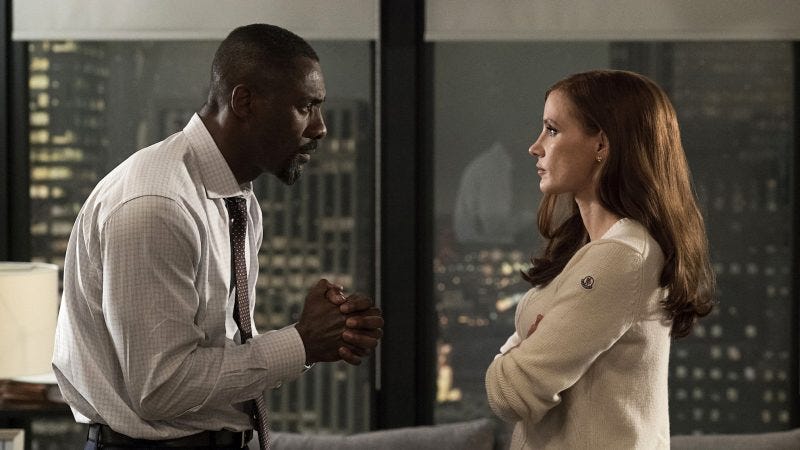Molly's Game

Aaron Sorkin is perhaps one of the most admired writers of the last three decades. His penchant for weaving snarky, lightning-quick rhetoric into his characters’ dialogue is what typically sets his movies apart and makes them inherently “Sorkin.” He likes writing the smartest person in the room, and—as seen in The Social Network, Moneyball, and The Newsroom—that dynamic can play as captivating, sometimes perversely fascinating entertainment. These know-it-all characters are fun to watch and listen to because of the ease with which they navigate a conversation, often belittling or at least stunning their opponents with their quick wit and intellect. The problem with this style of writing occurs when the writer can't decide who the smartest person in the room is. This is perhaps the biggest flaw with Sorkin’s directorial debut, Molly's Game. The secret-high-stakes-gambling-focused biopic is wildly snarky and provocatively shady, but its dialogue clips by with such rapid fire smarm that it sometimes feels emotional hollow and self-aggrandizing on Sorkin’s part, as the writer. That said, it's undeniably intriguing and entertaining.
Molly's Game recounts the story of near-Olympic skier Molly Bloom (Jessica Chastain), who is prevented from achieving her dream when a freak accident at the U.S. Olympic trials results in an injury so severe that she's told never to ski again. Actually, that's just the first five minutes of the film. The rest of the movie follows Bloom as she uses her hard-earned wits and cool to gain a sense of achievement by another means: running high-stakes poker games for celebrities and rich entrepreneurs in secret. The story is told in non-linear fashion, with Bloom beginning in the law office of attorney Charlie Jaffey (Idris Elba), asking him to represent her as she goes on trial for illegal sports gambling and racketeering. Jaffey us understandably reluctant, given that the tabloids have painted Bloom in the harshest of lights, but Bloom insists that there is more to her story than it seems. Throughout the rest of the film, Bloom's conversations with Jaffey are intercut with flashbacks of her rise to and fall from wealth and power in the secret, white-collar poker world.
The performances given are mostly satisfactory, and at times pretty impressive, with a few small moments of greatness. Jessica Chastain holds her own as the confident and determined Bloom, and she attempts to inject some humanity into the snidely-written “Poker Princess,” to varying degrees of success. Idris Elba gives a sense of fortitude and principle to Jaffey, while still matching Bloom in their conversational chess game. Elba is given an impassioned monologue late in the film, which the actor absolutely nails. It's almost good enough to make the movie's sometimes sluggish runtime worth it by itself. Kevin Costner, who supports as Bloom’s demanding, flawed father, probably rings the most false of the main cast, perhaps partly because his re-entry into the story after the opening flashbacks of Molly's skiing feels forced and unlikely. Still, Costner’s coldness works better than his late-appearing empathy. The ensemble of wealthy gamblers (which includes a cameo by an unexpected popular movie star, playing not-exactly-himself-but-kinda) are effectively scummy, but nothing especially memorable.
The biggest issue with the characterization in Molly's Game is the disagreement between Sorkin’s intelligent-asshole dialogue and his attempts at making the characters sympathetic. He made it work in The Social Network because his take on Facebook founder Mark Zuckerberg was a neurotic, borderline psychopathic lizard-person who only sees any reason to feel or care when confronted with a world that hates him. It made for a tragic arc of realization. In Molly's Game, too many people who are supposed to be “the good guy” come across as that same cold-shouldered, witty jerk. This, of course, is all a result of Sorkin’s apparent need to call attention to the dense, confident script he's written. It makes for entertaining, “smart” dialogue, sure, but ultimately, somewhat unfulfilled characters.
Additionally, Sorkin could have stood to get some style points in the visual department, but the slick, clever characters are framed in clean, crisp, and sleek lighting and sets you'd expect to see in a Rolex ad or luxury car commercial. It makes some sense, given the white-collar environment, but it's a relatively uninteresting aesthetic, when compared to similar biopics of recent years like I, Tonya and The Wolf of Wall Street, both of which have more vibrant, punchy visual styles.
Molly's Game is a fun and clever movie. The snappy dialogue and relatively strong performances from its two leading figures make it a worthwhile piece of entertainment, and the true story is absurd enough in itself to maintain interest. That said, it's not nearly as smart as it thinks it is, nor as smart as some of Sorkin’s previous work, and it suffers from a few lapses in emotional authenticity and slow pacing. It's worth a look, especially if you like Sorkin’s writing style, but I'd say this one is undeserving of the likely consideration it will receive in the upcoming awards races. Perhaps Sorkin should stick to letting better directors interpret his scripts.
https://www.youtube.com/watch?v=Vu4UPet8Nyc&w=585


